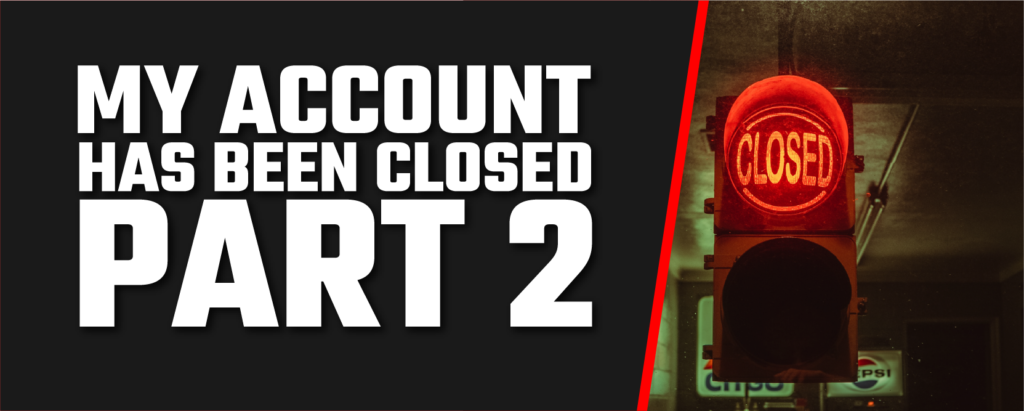In Part 1, we discussed some of the reasons that banks, etc., cancel processing agreements and terminate merchant accounts. In What To Do If Your Merchant Account Is Closed (Part 2), we will look at some signs that your account is in danger of being closed, and what to do in the event that it actually is closed.
Trouble on the Horizon
As mentioned, merchant accounts are often closed suddenly, without notification in advance to any meaningful degree. In a sense, the perception that the termination of the processing agreement occurs suddenly is misleading. Banks have their own process for making the decision, and there are steps taken before the death blow.
The first sign of trouble on the horizon is usually revenue holds. In the case of high-risk businesses, banks usually withhold part of the merchant’s revenue as a reserve to cover losses that may occur, such as insufficient funds in the operating account. The withholding amount is specified in the processing agreement. Often, the merchant is required to provide a reserve at the time the account is opened. It is not rare for the amount to be equivalent to one or two months’ anticipated sales. Rolling reserves are sometimes used to hold back a percentage of sales each month.
If the business already has a merchant account, a reserve could be required (or the amount of the required reserve could be increased) due to the perception that risks have increased. This usually means the factors that make a business high risk in the first place have become more severe, such as a sudden increase in chargebacks or claims of unauthorized transactions. Any time a hold is newly placed on a merchant account, you need to view it and deal with it as a warning sign that the merchant account will probably be closed before the end of the month.
Along with the other problems that will be caused, the bank will probably freeze your funds for a number of months, so it is worth some extra effort and expense to prevent this from happening.
What Do I Do Now That My Merchant Account Was Closed?
So, what do you do now? How do you prevent the closing of your merchant account from doing long-term damage to your business?
Each situation will differ to some degree, but generally speaking, you will need to do the following.
Ask the bank, etc., why your merchant account was closed
The reason might not be what you assume that it is, and it’s important to know exactly what happened so that you can make any necessary changes.
Check the Member Alert to Control High-Risk Merchants (MATCH) List
The MATCH List is a database that provides information about businesses and owners whose merchant accounts have been canceled. Credit card networks require banks to register all terminated merchant accounts on the MATCH List. The process of applying for a new merchant account will be different if your business has been placed on the MATCH List, so it is important to confirm whether it has nor not.
Be sure to save at least six months’ worth of processing statements
Confirm that you have all necessary documents before you lose access to the bank’s online reporting system.
Find a new payment processor
Having your merchant account closed by the bank, or not being able to open an account in the first place, is certainly bothersome, but it doesn’t mean that you’re out of options. Don’t waste your time and energy going to a traditional bank or some of the popular payment processors such as PayPal . Your business was considered by banks to be high risk to begin with, and actually having a canceled merchant account on your record won’t make them less reluctant to provide a new account. Many banks even have a policy of not providing accounts to businesses that have had a merchant account canceled.
Fortunately, there are payment processors that are willing to work with high-risk businesses, and some of them even specialize in providing services to such businesses. Their experience and expertise can be an enormous resource as you work to get your operation back on track.
Don’t sugarcoat anything
Playing down your situation in the hope of making your business more attractive to a new payment processor is not only dishonest, it is also highly unlikely to work out well for you. The new account provider will get the details anyway, and all that you would be doing is providing documented evidence of your untrustworthiness. A high-risk payment processor can be a great benefit to your business, and not being open and honest with them will only make it harder to get your business on track.
Be patient
Understandably, the process for taking on a high-risk business as a client is longer than for other businesses opening accounts at traditional banks. The payment processor also wants to finish it as soon as possible, but it’s vital that everything is taken care of properly. Getting upset and abandoning professionalism and basic manners because you mistakenly think that being overbearing is the best way (or even an acceptable way) of getting things done will come back to haunt you eventually, and more often than not, immediately.
Be complient
The new payment processor will of course screen you and your business carefully, and will of course be more careful with businesses that have had a merchant account terminated in the past. Make sure that you, your employees, and your business are fully compliant with any existing agreements as well as the relevant laws and regulations. Don’t make the mistake of thinking that everything is fine as long as your company doesn’t cause any major accidents or have any significant problems with product quality, or that financial institutions will be fine with lazy accounting or other lackadaisical management.
If you do the above, you should be able to obtain the services of a suitable payment processor without undue trouble.
Use the Experts
As has been mentioned, high-risk payment processors are specialists in solving some of the problems that you face as the operator of a high-risk business. External circumstances certainly do come into play, but if you have had a merchant account canceled, it is almost certain that you need to change your approach in some way. The most common area of deficiency is chargeback management. High-risk payment processors can provide much help with this, and there are effective chargeback management tools available. Be sure to make use of those resources, and never hesitate to ask questions.





